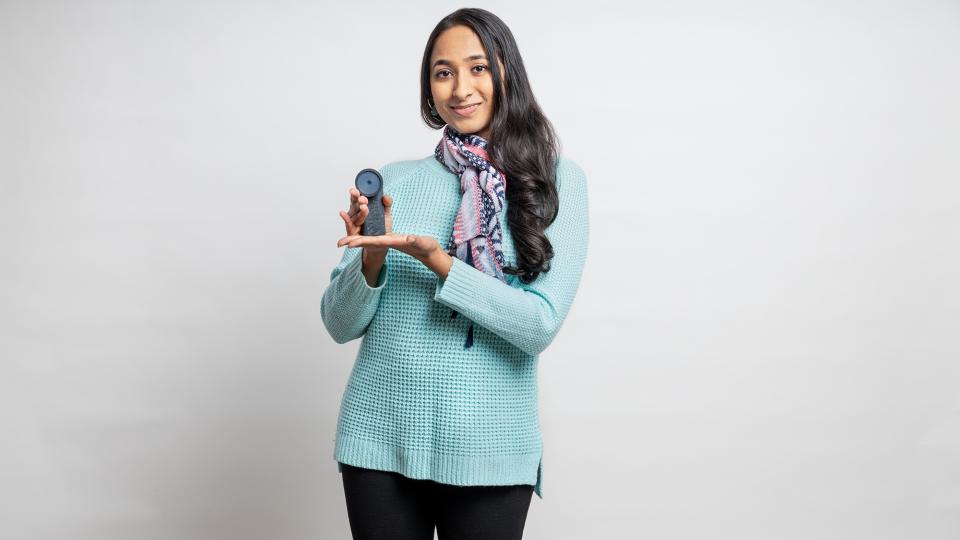
Korion Health, a startup with an electronic stethoscope to do at-home heart and lung screenings, won the prestigious $1 million Hult Prize on Sept. 6 in London. The company is co-led by CTO Akshaya Anand ’19, M.P.S. ’23, a University of Maryland grad who worked closely with the Dingman Center for Entrepreneurship at the Robert H. Smith School of Business.
Korion Health was one of six finalists to pitch for the top prize out of more than 94,000 applicants in the global competition looking for the best social innovation-based student-run startup.
Korion’s device has enormous potential to help save lives. Heart disease is the leading cause of death for people across gender and racial lines in the United States. But more than 80% of heart attacks and strokes could be prevented, according to the American Heart Association. With Korion’s USB-powered stethoscope and online platform, millions of Americans could improve their odds of maintaining cardiovascular health, right at home.
Anand joined co-founder and CEO Anna Li, a University of Pittsburgh and Carnegie Mellon University M.D./Ph.D. student, after meeting at a Pitt hackathon a year into the pandemic. Throughout the startup process, Anand has relied on UMD resources, like Startup Shell and the Dingman Center, where she found mentors, networking opportunities, and referrals for technology credits and discounts. She went through Dingman’s Terp Startup Accelerator and Terp Startup Fellows program in 2023. The business side has presented some of the toughest challenges, said Anand, who studied biological sciences and computer science.
“I always knew fundraising was hard, but it’s very draining. I’ve had to step outside my comfort zone,” she said, joining pitch competitions, participating in startup accelerators and presenting to investors.
With the $1 million Hult Prize win, Anand and Li can focus on the next big hurdle for the company: the U.S. Federal Food and Drug Administration approval process, since they’re creating a medical device. Securing that will let Korion Health get their devices to patients to impact care.
“Telemedicine has a lot of potential to bridge barriers and make it convenient for people to access health care,” said Anand. “But it’s limited by lack of tools. Your doctor can’t reach through the computer screen. We thought: Is there a way we can use technology to make the playing field more equal.”
Using Korion Health’s device, patients, especially those in rural areas and in marginalized and lower-income communities, will be able to collect vital data at home, then send the audio files to their physician before a telehealth visit.
As a medical student during the pandemic, Li noticed patients coming into the emergency room sicker than usual because they couldn’t access regular care to monitor chronic health conditions—challenges that continue today, as wait times to see providers lengthen.
“So many people that I care about have fallen through the cracks of the health care system,” said Li. “We want to create a way for people to get any health screening they need from the comfort and convenience of their own homes, in an affordable and accessible way.”
Advised by cardiologist Dr. Eric Dueweke of Pitt, the co-founders interviewed physicians, especially telemedicine providers, to understand their needs. A common theme was the benefit of data collected over time, especially if patients see multiple health care specialists.
“If a patient has a murmur, our device could help see if that murmur is changing—that could indicate something else is going on,” said Anand. “It’s hard to remember how someone’s heart sounded a year ago, so being able to digitize that sound is a benefit.”
Since 2021, they’ve created an initial prototype and tested it in a 20-person pilot study. That feedback informed their second iteration of the device and pilot this past summer. They’re focused on making it as easy to use and error-proof as possible, so that the sounds collected are accurate and useful for providers. The eventual goal is to use machine learning algorithms to help diagnose conditions based on patient data.
Once they get their stethoscope to market, they hope to expand into devices to monitor the health of organs, including eyes, ears and the gastrointestinal tract.
Working on Korion Health “fills me with purpose,” said Anand. “Every day I wake up motivated and excited, working on something to help others in the community. That makes all the difference.”
This is adapted from a story published by Maryland Today in April 2024, written by Karen Shih. Updated with new information about the Hult Prize.
Media Contact
Greg Muraski
Media Relations Manager
301-405-5283
301-892-0973 Mobile
gmuraski@umd.edu
About the University of Maryland's Robert H. Smith School of Business
The Robert H. Smith School of Business is an internationally recognized leader in management education and research. One of 12 colleges and schools at the University of Maryland, College Park, the Smith School offers undergraduate, full-time and flex MBA, executive MBA, online MBA, business master’s, PhD and executive education programs, as well as outreach services to the corporate community. The school offers its degree, custom and certification programs in learning locations in North America and Asia.